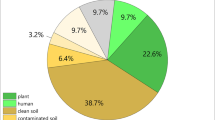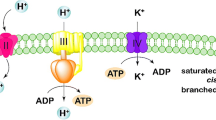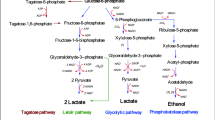Abstract.
The influence of pH on growth, enterocin P production and glucose consumption by Enterococcus faecium P13 was studied during anaerobic batch fermentation in MRS broth at 32 °C in a fermentor. Growth and glucose consumption were maximal at pH 7.0. Enterocin P production displayed primary metabolite kinetics and was strongly dependent on pH. A maximum antimicrobial activity of 1,949 bacteriocin units (BU) ml–1 was obtained at pH 6.0, which represented a four-fold increase compared with the antimicrobial activity obtained without pH regulation. The pH exerted a marked effect on the decrease in bacteriocin activity,with the decrease being maximal at pH 7.0. In this report, we propose models for the growth of E. faecium P13 as well as enterocin P production and inactivation. Enterocin P production decreased when potentially stress-inducing compounds (NaCl or ethanol) were included in the growth medium.
Similar content being viewed by others
Author information
Authors and Affiliations
Additional information
Received revision: 9 February 2001
Electronic Publication
Rights and permissions
About this article
Cite this article
Herranz, .C., Martínez, .J., Rodríguez, .J. et al. Optimization of enterocin P production by batch fermentation of Enterococcus faecium P13 at constant pH. Appl Microbiol Biotechnol 56, 378–383 (2001). https://doi.org/10.1007/s002530100656
Received:
Accepted:
Issue Date:
DOI: https://doi.org/10.1007/s002530100656




